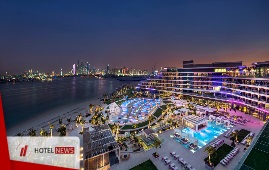
"Masihullah Safa", the head of the Kish Island Hoteliers Association, announced; Kish hotels were among the first to be closed due to the outbreak of the corona virus. As the situation in Kish became white, the hotels on the island began to attract passengers from June 1, 2020. Kish hoteliers are trying to reduce the occupancy rate of their rooms to less than 70% in order to better comply with health guidelines.
Create: May 27, 2020 Edit: May 27, 2020 Regional News
Alireza Khazaeli, Director General of Cultural Heritage, Tourism and Handicrafts office of Qazvin Province announced; In the last 5 years, the province's accommodation capacity has increased as much as in the last 30 years. The Baghdadi, Nowruzian, Alamut and Diamond West hotels in Avaj are among the major hotels being completed this year. The construction of five-star hotels in Qazvin province is one of the most important investment priorities that has not yet been achieved.
Create: May 17, 2020 Edit: May 17, 2020 Regional News
The European Commission has unveiled a multi-step plan to reopen borders, airports and hotels in the summer to save the tourism industry from the crisis. Under the proposed plan, travel restrictions between EU member states, which have similar conditions in terms of the number of people infected with the coronavirus, will be reduced. Online purchase of tickets, reduced number of passengers in vehicles, use of masks, access to disinfecting gels during travel and no drink and food service on airplanes and ships are among the proposals of the European Commission. A reduction in the number of employees has also been proposed.
Create: May 14, 2020 Edit: May 15, 2020 International News
The Egyptian government has announced that it will open hotels to domestic tourists, provided they do not exceed 25 percent of their capacity by the end of this month and apply a series of treatments to fight the coronavirus. Providing clinic and medical services, temperature assessment of clients, constant use of disinfectants, electronic registration of guests and conducting immediate tests are among the requirements of the Egyptian government to reopen hotels.
Create: May 5, 2020 Edit: May 6, 2020 International News
TEHRAN – Japan and Austria have significantly downgraded their travel warnings on Iran, a caution they, amongst some other countries, issued following the deadly crash of a Ukrainian plane near Tehran last month. The jetliner, with 176 people onboard, was mistakenly downed on January 8 by the Islamic Revolution Guards Corps (IRGC) air defense system, a few hours after Iran fired dozens of missiles at a U.S. airbase inside Iraq in retaliation to the assassination of Iranian Lieutenant General Qassem Soleimani in Baghdad on January 3. “The Ministry of Foreign Affairs of Japan has eliminated its travel warning on Iran [asking its citizens to avoid ‘non-essential’ travel to the country] and it has also terminated depicting Iran’s security map with a warning sign,” ISNA reported on Tuesday. An advisory, which warned about traveling to Iran, is now deleted from the website of the ministry, the report added. Austrian ambassador to Tehran Stefan Scholz on Monday wrote on his Instagram account that his country has lowered its travel warning for Iran. “Austria has downgraded its travel warning for Iran, repealing its general advice against non-essential travels following a thorough reassessment of the security situation.” “We believe that the risk to Austrian nationals except for some specific border areas has changed. This decision will also further contribute to civil society contacts and commerce,” the envoy added. Late in January, the EU Aviation Safety Agency (EASA) approved that European airlines can return to parts of Iranian and Iraqi airspace. Germany’s Lufthansa was among airlines that canceled flights over the affected airspace. Inbound tours started to severely drop following the crash, triggering a major setback to Iran’s budding tourism industry. The blow, however, is being hoped to be amended as soon as possible by a comprehensive action plan Iran’s tourism ministry has put into practice since January 25. In the same time, Iran’s Minister of Cultural Heritage, Tourism and Handicrafts Ali-Asghar Mounesan issued a statement, inviting all travelers and holidaymakers to visit the ancient land, saying that the country-size guesthouse is wholeheartedly ready to receive tourists from around the world. The official emphasized that the Iranian government is trying its best to host incoming tourists by improving tourism infrastructure, offering attractive and pocket-friendly packages, as well as incentives such as visa waivers or 90-day visas on arrival. The 2019 Travel Risk Map, which shows the risk level around the world, put Iran among countries with “insignificant risk”, a category where the UK, Denmark, Switzerland, Norway, and Finland are placed in.
Create: Feb 19, 2020 Edit: Feb 19, 2020 Regional News
Marriott International announced it signed a record number of rooms in 2019, pushing its global pipeline to approximately 515,000 rooms as of year-end 2019 for the first time in the company’s history. The company signed 815 agreements, representing more than 136,000 rooms, marking the seventh consecutive year of record-breaking volume of organic rooms signings. Growth was fueled by unprecedented levels of organic rooms signed in each of the company’s international regions. During 2019, the company added 516 properties with more than 78,000 rooms in 60 countries and territories – an average of one new property every 17 hours. “With growth and loyalty as the cornerstones of our company’s success, our unrivaled 2019 signings illustrate our winning strategy, which combines leading brands, powerful business platforms and an enduring focus on our associates,” said Tony Capuano, Group President, Global Development, Design and Operations Services, Marriott International. “We continue to drive value for our owners with quality branding options for both property conversions and new builds, backed by our leading business support systems and loyalty platform. By staying true to our growth philosophy and continuously responding to the evolving preferences and lifestyles of travelers, we are poised for a successful 2020 and beyond.” At the end of 2019, Marriott International’s worldwide system consisted of more than 7,300 properties and roughly 1.38 million rooms in 134 countries and territories. More than half of the company’s record global development pipeline is located outside North America. “With 141 million Marriott Bonvoy members who increasingly crave travel to new cities and unique experiences around the world, a record-breaking year of deals means new, exciting properties are coming for travelers worldwide,” said Stephanie Linnartz, Group President, Consumer Operations, Technology & Emerging Businesses, Marriott International. “Our stellar growth results prove that our broad brand portfolio and platforms are resonating with owners and developers, as well as with customers.” Record-setting year for growth in valuable international markets In 2019, 53 percent of the company’s signed rooms were outside North America with record-breaking organic volumes in the company’s Asia Pacific (38,000 rooms), Europe (17,000 rooms), Caribbean and Latin America (more than 9,000 rooms), and Middle East and Africa (8,000 rooms) regions. Additionally, in 2019, Marriott International debuted its first hotels in four additional countries – Cyprus, Moldova, Kyrgyzstan and Latvia. Company extends its lead in luxury Marriott International did a record-breaking number of deals for its global luxury hotel brands, bolstering its lead in this high-value segment. In 2019, the company signed 42 luxury projects in 27 countries and territories, while opening or converting 34 properties such as The St. Regis Venice, W Dubai – The Palm, The West Hollywood EDITION and The Ritz-Carlton, Pune. As the company focuses on expanding its leading luxury footprint, it is revitalizing W Hotels. Last year, the company purchased the W New York – Union Square, with plans to transform the property into a showcase for the brand’s future look. Successful all-inclusive launch Last August, Marriott launched its all-inclusive platform to bring its brands, scale and trusted service to this growing, global vacation segment. Less than six months after its launch, the company has signed seven management and franchise agreements for all-inclusive properties representing nearly 3,200 rooms. Among the all-inclusive projects in development are an 800-room Marriott Hotels resort in Jamaica and a 240-room Ritz-Carlton resort in Mexico. The company last year also completed its acquisition of Elegant Hotels Group, which consists of seven hotels and 588 rooms located on the picturesque island of Barbados. Affordable lifestyle hotel brands buoy company growth Catering to the next generation of travelers, the company’s AC by Marriott, Aloft and Moxy brands opened nearly 10,000 rooms in 2019. Combined, these brands represent more than 65,000 open rooms in 44 countries and territories, including new hotels in Greece, Ireland, Jamaica, Latvia, Nepal and Switzerland. The company signed nearly 24,000 rooms across the AC by Marriott, Moxy and Aloft brands during the year – with record room signings for both AC by Marriott and Moxy.
Create: Feb 9, 2020 Edit: Feb 9, 2020 International News
Coming to Mexico’s Riviera Nayarit, the thoughtfully designed Conrad Punta de Mita will offer travelers an authentic, tranquil respite. Situated among the area’s serene natural landscapes and aquamarine waters, the new-build resort will deliver an inspired beach vacation, the Conrad way. Drawing influence from Mexico’s rich history and unique culture, indigenous artwork will integrate with exceptional amenities to create a sense of barefoot resort elegance that highlights its local Mexican identity. All 324 guest rooms and suites will boast views of the Pacific Ocean, with suites offering large patios, plunge pools, freestanding soaking tubs and outdoor showers. Amenities will include three pools, each with its own purpose. Guests looking to indulge in R&R can lounge poolside with a cocktail at the adult pool, while the more active type swim laps in the activity pool. Kids will bask under the Punta de Mita sun in the family pool, with a game room and kids’ club rounding out activities for young explorers to connect with each other and the world around them. Four restaurant and three bar concepts will offer menus and spaces that pay tribute to age-old techniques and flavors of the local culture — among them, an intimate mezcal and tequila barrel tasting room, and a joyous lobby bar, Tuki, which borrows its name from the Huichol word for ’temple.’ The Conrad SPA will offer a refuge from the pace of everyday life with a unique indoor/outdoor design and traditional temazcal spread across 10,000 square feet. Seven cocoon treatment cabanas will be nestled among the vegetation and connected by an inspiring tunnel of plants and flowers. Fitness center offerings include an outdoor lawn for yoga and stretching. Groups will stay inspired with 54,000 square feet of event space that ranges from boardrooms to beaches, with custom activities, authentic cuisine and cultural experiences.
Create: Jan 31, 2020 Edit: Jan 31, 2020 International News
On February 15th, 2003, the first group of 67 Chinese officially travelling for leisure arrived in Germany, based on the ADS Approved Destination System agreement China and Germany signed the year before, second in Europe only to the island state of Malta, while for the rest of the Schengen Area the ADS agreement came only into force in September 2004. Your humble editor had stopped a few years earlier to be an inbound tour operator for Chinese delegations and had just finished the first semester as a tenured university professor. Witnessing the high expectations of my former colleagues, all buying coaches, employing additional staff and moving into bigger offices, I wondered if I had taken the wrong decision to opt out of the business just before the biggest bonanza ever for the German China inbound tour operators, looking forward to enjoying a year without competition in Europe. Unknown at the time, in November 2002 SARS (severe acute respiratory syndrome) started in Guangzhou and spread to many countries in the world. On March 15th, 2003, the WHO issued a global alert about a new infectious disease, advising against any unnecessary travel to and from East Asia. On April 2nd, Chinese officials finally began reporting the severity and extent of the SARS outbreak. As a result the second quarter of 2003 saw almost no Mainland Chinese citizen arriving in Germany, pushing several inbound tour operators close to bankruptcy. For the whole year, the number of arrivals however reached the level of 2002, and 2004 saw an increase of almost 40%, as many of the trips to Germany influenced by the SARS crisis were only postponed, not cancelled. Globally the same happened: From 16.6 million in 2002 the number of outbound trips jumped to 20.9 million in 2004 despite the three-month hiatus. With the yet not fully named 2019-nCoV, things could turn out in a similar way, based on what is known until now. On the one hand the disease is spreading much faster, given the much improved domestic and international transport infrastructure available in comparison to 2003, on the other hand the Chinese government reacts in a much different way to the crisis. Among many others, starting from the 27th of January, all group travel from China has to cease. Individual travellers however will have a bigger incentive than before to go abroad. The biggest difference is clearly the fact that in 2003 outbound tourism was the least concern except for those few directly involved during the SARS crisis. In 2020 there are already articles published discussing the fate of the tourism industry of Thailand, Japan and other countries if the main source market China implodes. Via an open letter of the CATS China Association of Travel Services published on the 26th, the international partners have been asked to “introduce relative refund and changes policies to minimize Chinese tourists financial loss”. How much this will remain a wish or will become a demand, is one of the many unknown factors in the 2019-nCoV development. The main concern remains of course to minimize the loss of life in China. In all previous cases, being it SARS, MERS or the Lehman Brothers global economical crisis, demand bounced back stronger than before after two or three months. So it will be a good idea to use the time of the slowdown to train everybody involved in servicing Chinese customers, using the brand new CTT China Tourism Training. Let’s hope that the Year of the Rat will have a better ending than this dire beginning and that all our readers, their colleagues, family and customers will stay healthy.
Create: Jan 31, 2020 Edit: Jan 31, 2020 International News
A Life Without Reservations: As a new decade started upon Rosewood Hotels & Resorts, the ultra-luxury hospitality company is intensely focused on the global expansion of its branded residential business, Rosewood Residences. With 15 existing residential projects globally and an additional 14 in the pipeline, Rosewood is intent on continuing to grow its residential business with a guest-centric approach, while staying true to the brand's A Sense of Place® philosophy. This strategy has been at the core of the brand's remarkable hotel growth and will remain central to the company's ascent as the preferred option in luxury living. Rosewood Residences occupy the most sought-after locations at select Rosewood Hotels & Resorts properties around the world. Perhaps the best-known precursor to today's branded residential lifestyle is The Carlyle, A Rosewood Hotel, located on New York's Upper East Side. Conceived in the 1930s, few hotels have risen to global prominence like The Carlyle, which was known as the "New York White House" during the Kennedy era in the 1960s. Rosewood Hotels & Resorts is building upon the success and heritage of its existing properties through the development of new hotels and residences across the globe. "Approximately 50 percent of Rosewood's pipeline properties have a residential component and we expect this ratio to increase over the coming years," said Karl Bieberach, chief development officer for Rosewood Hotel Group. "As we set off into a new decade, we are expanding our residential resources in order to better support our owners and developers in their sales and marketing processes while strengthening relationships with buyers of Rosewood-branded residences. We remain focused on delivering truly differentiated products for Rosewood Residences owners, who, by choosing to live a Rosewood-branded lifestyle, are among our biggest brand loyalists." A Residential Vision for a New Decade Rosewood Hotels & Resorts residential offerings include two main categories; for-sale residences and for-lease serviced apartments. The brand's unrivalled design ethos and genuine residential style offer a unique opportunity to enhance the way affluential explorers live, by making a larger array of residential offerings available, regardless of category. In addition to residential components within mixed-use hotel projects, Rosewood Hotels & Resorts plans to embark on stand-alone residences. "We are excited to continue the growth and development of Rosewood Residences, a sector of the brand beloved by our most loyal Rosewood guests," said Irene Hoek, vice president of global residential development for Rosewood Hotel Group. "Within each ultra-luxury Rosewood Residence, the unique culture of the dynamic locale is embraced and showcased from start to finish. This model will continue to be at the forefront of all future developments we lead across the globe." A Life Without Reservations Whether clients rent or own a Rosewood-branded residence, living the Rosewood lifestyle comes with perks and benefits that are unmatched in hospitality. Aside from a myriad of luxury amenities and the highest level of security, the Rosewood lifestyle unlocks the opportunity to savour more of life's precious moments. From taking care of party planning, running errands, organizing social agendas and home repairs, the qualified team at Rosewood Hotels & Resorts will oversee the residences' needs. Complementing the brand's renowned, intuitive service and recognizing the most loyal owners, Rosewood Hotels & Resorts has launched Rosewood Reserve, an exclusive program available to residence owners, offering advantages and benefits at all properties across the globe. Benefits of Rosewood Reserve include preferred rates on rooms, food and beverage and spa, room upgrades, and additional VIP courtesies including access to a global concierge to assist with all travel-related requests. Rosewood Residences span a collection of unique properties in dynamic cities with for-sale residences and serviced apartments such as at Rosewood Abu Dhabi, as well as within quiet vacation destinations like Tuscany, Italy at Rosewood Castiglion del Bosco. Rosewood Hotels & Resorts is enhancing the portfolio with the development of residences around the world.
Create: Jan 31, 2020 Edit: Jan 31, 2020 International News
INTRODUCTION With new technology trends such as the internet of things (IoT), many businesses have been able to improve their operations as well as make them more up to date. In the hotel and hospitality industry, technology has helped make many hotels and resorts more efficient as ones that are capable of providing better service for their guests. Technology in the hospitality industry has been able to capitalize on the internet of things (IoT) by providing a better user experience for guests. Today, guests can make reservations through an application and schedule their stay with their smartphones. Along with the internet of things, technology in the hospitality industry has also included new and more advanced software. The new hospitality technology has greatly advanced the operations of hotels in terms of allowing guests to get rooms and gain access to all of the available services offered. Today, the new hospitality technology can help hotels schedule events more efficiently, process room reservations and monitor revenues and financial transactions more easily. The development of hotel and hospitality software has enabled hotels to be even more organized than they have been in the past. As a result, they are even more likely to provide more satisfaction for their guests consistently. SMART GUEST EXPERIENCES Today many hotels have followed some key trends that have allowed them to better meet the unique needs of their guests. Along with using cloud-based software, hotels nowadays have become more personalized as they are even more focused on helping their guests have the best experience possible when staying at their establishment. In recent years, there has been a tech explosion in the hotel and hospitality industry. The use of cloud-based software has allowed hotels to more efficiently manage their transactions and daily tasks. It has also allowed guests to rely on apps and mobile websites to make requests and get the services that they need for their stay. This technology has helped make a modern hotel into a smart hotel as they have become more user-friendly. Another trend that has contributed to the development of the modern smart hotel has been seamless technology. This includes features such as mobile check-in and digital concierge services. Today, hotels provide high tech cards that detect the presence of a guest and open the door before they even get to it. This has provided guests with more convenience as they can just walk into their room instead of sliding a card into it. Mobile check-ins have enabled guests to process their arrival digitally and avoid relying on a front desk clerk to complete this task for them. As a result, both the guests and the hotel workers can save a lot of time. 7 TECH TRENDS YOU CAN’T IGNORE IN 2020 In the past hotels were just places for people to sleep and unwind during trips when they were away from home. However, there has been a lot of change in the industry during the past several years. Today, hotels have become places where several activities take place. These include seminars, business meetings, and conferences. There have been many additional hotel technology trends that have drastically changed the industry. 1. MOBILE DEVICES AS DOOR KEYS One of the most recent hotel technology trends has been the development of mobile devices as door keys. Hotels today provide cards that are items that put data onto a guest’s mobile device. With this card, guests can more easily access their rooms and other areas of the hotel such as the gym and spa. These cards can also be visually scanned to process entry into these areas of the hotel. 2. SERVICE AUTOMATION In recent years hotels have allowed guests to serve themselves. Most guests prefer to use technology rather than interact with humans. As a result, the development of remote check and check out has allowed guests to use apps to complete these menial tasks. Since the new technology has created more automation, both guests and hotel workers can spend more of their time focusing their efforts on other activities. 3. FIXED MOBILE CONVERGENCE Over the past few years, room phones in hotels have had a reduced role in use among guests. However, the room phones of the present and future will often provide a larger role in terms of connectivity. Today, a guest can use their mobile phone to control things such as the television, the sound system and the blinds of their room. They can also use the mobile phone to request wake up calls, get informed about a visitor’s arrival and requesting a cab or driving service to transport them around town. 4. GUEST APPS The new technology in the hotel industry has resulted in new guest apps. These are options that allow guests to receive information on new hotel deals, notifications about hotel services and also loyalty programs. The guest app can also provide an itinerary to an event as well. 5. BANDWIDTH With the development of technological devices such as laptops, smartphones, and tablets, the demand for bandwidth is very high. As a result, hotels have significantly increased the amount of available bandwidth to accommodate guests who frequently access the internet for the devices. 6. LOCATION-BASED SERVICES New location-based services have also emerged as a key to the advancement of technology in the hospitality industry. With location-based services, guests can locate hotel workers and staff more easily. As a result, they can more efficiently get the assistance they need whenever necessary. 7. TECH LOUNGES Another new trend in the hotel and hospitality industry has been tech lounges. With tech lounges, hotels can provide guests with a public space to use technological devices and complete tasks using technology. The new tech lounges have become a preference among many guests in recent years. CONCLUSION Like all other industries, the hotel and hospitality industry has undergone many significant changes over the past few years. Hotels have made these changes with the help of the latest hospitality and travel software. With this new hospitality and travel software, hotels have been able to help themselves operate more easily as well as satisfy the needs of their guests. During the last few years, hotels have introduced several technology options that include automated check-ins, staff location services, mobile door keys, and tech lounges to provide a more fulfilling experience for guests.
Create: Jan 26, 2020 Edit: Jan 26, 2020 International News
Following the news that the number of international tourists is set to reach a record in 2022 and no country will see a greater increase in international arrivals than Japan. Johnatan Vandesquille, Analyst, Travel & Tourism, at GlobalData, a leading data and analytics company, offers his view on the situation: “The tourism industry is forecast to maintain steady growth up to 2022, driven by the rise of middle and upper classes in emerging economies, as well as the development of new destinations. “GlobalData forecasts Japan to experience growth in the number of international tourists at a compound annual growth rate (CAGR) of 11.3%, the largest increase among the countries observed. This growth can be attributed to the overall success of the 2019 Rugby World Cup and the positive impact of the Olympics, which are being held in Tokyo this year. These events have helped the development of tourism infrastructure and will increase the visibility of the destination in the near future. “France is expected to remain the most visited country in the world with 99.6 million tourists in 2022, but more than a year of civil unrest and the potential impact of Brexit (the UK being its main source market) will slow tourism growth and the country may fall short of its objective of 100 million visitors, originally set for 2020. “Diplomatic tensions are the main obstacle to international growth, as illustrated by South Korea and China, which are both currently experiencing issues with their main source markets. “However, these tensions seem to benefit Vietnam, the fastest growing tourism market in South-East Asia, which is expected to capitalize on the overall popularity of the region and the projected exponential development of South Korean outbound tourism.”
Create: Jan 26, 2020 Edit: Jan 26, 2020 International News
A 4% increase on the previous year which is also forecast for 2020, confirming tourism as a leading and resilient economic sector, especially in view of current uncertainties. By the same token, this calls for such growth to be managed responsibly so as to best seize the opportunities tourism can generate for communities around the world. According to the first comprehensive report on global tourism numbers and trends of the new decade, the latest UNWTO World Tourism Barometer, this represents the tenth consecutive year of growth. All regions saw a rise in international arrivals in 2019. However, uncertainty surrounding Brexit, the collapse of Thomas Cook, geopolitical and social tensions and the global economic slowdown all contributed to a slower growth in 2019, when compared to the exceptional rates of 2017 and 2018. This slowdown affected mainly advanced economies and particularly Europe and Asia and the Pacific. Looking ahead, growth of 3% to 4% is predicted for 2020, an outlook reflected in the latest UNWTO Confidence Index which shows a cautious optimism: 47% of participants believe tourism will perform better and 43% at the same level of 2019. Major sporting events, including the Tokyo Olympics, and cultural events such as Expo 2020 Dubai are expected to have a positive impact on the sector. Responsible growth Presenting the results, UNWTO Secretary-General Zurab Pololikashvili stressed that “in these times of uncertainty and volatility, tourism remains a reliable economic sector”. Against the backdrop of recently downgraded global economic perspectives, international trade tensions, social unrest and geopolitical uncertainty, “our sector keeps outpacing the world economy and calling upon us to not only grow but to grow better”, he added. Given tourism’s position as a top export sector and creator of employment, UNWTO advocates the need for responsible growth. Tourism has, therefore, a place at the heart of global development policies, and the opportunity to gain further political recognition and make a real impact as the Decade of Action gets underway, leaving just ten years to fulfill the 2030 Agenda and its 17 Sustainable Development Goals. The Middle East leads The Middle East has emerged as the fastest-growing region for international tourism arrivals in 2019, growing at almost double the global average (+8%). Growth in Asia and the Pacific slowed down but still showed above-average growth, with international arrivals up 5%. Europe where growth was also slower than in previous years (+4%) continues to lead in terms of international arrivals numbers, welcoming 743 million international tourists last year (51% of the global market). The Americas (+2%) showed a mixed picture as many island destinations in the Caribbean consolidated their recovery after the 2017 hurricanes while arrivals fell in South America due partly to ongoing social and political turmoil. Limited data available for Africa (+4%) points to continued strong results in North Africa (+9%) while arrivals in Sub-Saharan Africa grew slower in 2019 (+1.5%). Tourism spending still strong Against a backdrop of global economic slowdown, tourism spending continued to grow, most notably among the world’s top ten spenders. France reported the strongest increase in international tourism expenditure among the world’s top ten outbound markets (+11%), while the United States (+6%) led growth in absolute terms, aided by a strong dollar. However, some large emerging markets such as Brazil and Saudi Arabia reported declines in tourism spending. China, the world’s top source market saw outbound trips increase by 14% in the first half of 2019, though expenditure fell 4%. Tourism delivering ‘much-needed opportunities’ “The number of destinations earning US$1 billion or more from international tourism has almost doubled since 1998,” adds Mr Pololikashvili. “The challenge we face is to make sure the benefits are shared as widely as possible and that nobody is left behind. In 2020, UNWTO celebrates the Year of Tourism and Rural Development, and we hope to see our sector lead positive change in rural communities, creating jobs and opportunities, driving economic growth and preserving culture.” This latest evidence of the strength and resilience of the tourism sector comes as the UN celebrates its 75th anniversary. During 2020, through the UN75 initiative the UN is carrying out the largest, most inclusive conversation on the role of global cooperation in building a better future for all, with tourism to be high on the agenda.
Create: Jan 26, 2020 Edit: Jan 26, 2020 International News
